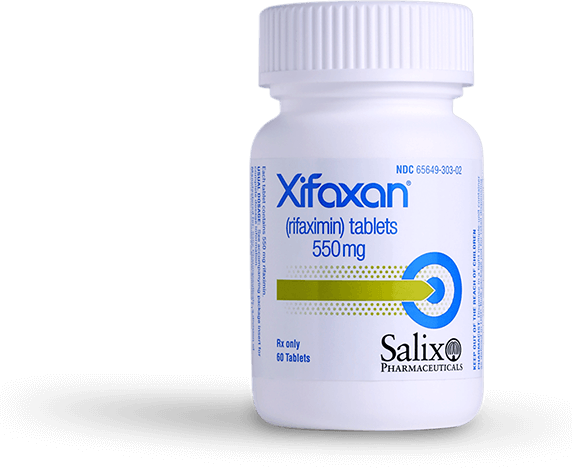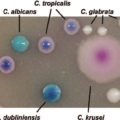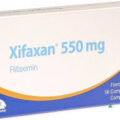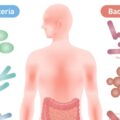What is Xifaxan?
Xifaxan is an antibiotic that helps ease gastrointestinal symptoms. It works as an antibacterial (kills harmful bacteria) and may change the make-up of bacteria in your gut in other ways yet to be determined. Xifaxan 200-mg tablets are used to treat traveler’s diarrhea caused by certain bacteria in adults and children at least 12 years of age. Xifaxan 550-mg tablets are used to prevent episodes of hepatic encephalopathy (changes in thinking, behavior, and personality caused by a build-up of toxins in the brain in people who have liver disease) in adults who have liver disease and to treat irritable bowel syndrome (with diarrhea) in adults.
Xifaxan is in a class of medications called antibiotics. Xifaxan treats traveler’s diarrhea and irritable bowel syndrome by stopping the growth of the bacteria that cause diarrhea. Xifaxan treats hepatic encephalopathy by stopping the growth of bacteria that produce toxins and that may worsen liver disease. Xifaxan will not work to treat traveler’s diarrhea that is bloody or occurs with fever.
Antibiotics such as Xifaxan will not work for colds, flu, or other viral infections. Taking antibiotics when they are not needed increases your risk of getting an infection later that resists antibiotic treatment.
Mechanism of action
Xifaxan interferes with transcription by binding to the β-subunit of bacterial RNA polymerase. This results in the blockage of the translocation step that normally follows the formation of the first phosphodiester bond, which occurs in the transcription process. This in turn results in a reduction of bacteria populations, including gas producing bacteria, which may reduce mucosal inflammation, epithelial dysfunction and visceral hypersensitivity. Xifaxan has broad spectrum antibacterial properties against both gram positive and gram negative anaerobic and aerobic bacteria. As a result of bile acid solubility, its antibacterial action is limited mostly to the small intestine and less so the colon. A resetting of the bacteria composition has also been suggested as a possible mechanism of action for relief of IBS symptoms. Additionally, Xifaxan may have a direct anti-inflammatory effect on gut mucosa via modulation of the pregnane X receptor.
How long does Xifaxan take to work?
A two-week course of the antibiotic rifaximin (Xifaxan) helps to relieve the symptoms of irritable bowel syndrome (IBS), and the relief lasts up to 10 weeks after stopping the medication, according to new research. If you are taking Xifaxan to treat traveler’s diarrhea, your symptoms should improve within 24 to 48 hours after you start taking the medication. If your symptoms do not go away or they get worse, or if you develop a fever or bloody diarrhea, call your doctor.
If you are taking Rifaximin to treat irritable bowel syndrome and your symptoms return after you have finished your treatment, call your doctor.
Take Xifaxan as directed, even if you feel better. If you are taking Xifaxan to treat traveler’s diarrhea or irritable bowel syndrome and you stop taking it too soon or if you skip doses, your infection may not be completely cured and the bacteria may become resistant to antibiotics. If you are taking Xifaxan to prevent hepatic encephalopathy, do not stop taking it without talking to your doctor as you may experience symptoms of encephalopathy.
How is Xifaxan used?
Xifaxan comes as a tablet to take by mouth with or without food. When Xifaxan is used to treat traveler’s diarrhea, it is usually taken three times a day for 3 days. When Xifaxan is used to prevent episodes of hepatic encephalopathy, it is usually taken twice a day. When Xifaxan is used to treat irritable bowel syndrome, it is usually taken three times a day for 14 days. To help you remember to take Xifaxan, take it around the same times every day. Follow the directions on your prescription label carefully, and ask your doctor or pharmacist to explain any part you do not understand. Take Xifaxan exactly as directed. Do not take more or less of it or take it more often than prescribed by your doctor.
What are the side effects of Xifaxan?
Xifaxan’s side effects are usually not serious and can include:
- Nausea
- Dizziness
- Fatigue
- Muscle spasms
- Itching
- Abdominal pain
- Accumulation of fluid in the legs (peripheral edema).
In studies on the effectiveness of Xifaxan, the number of people who stopped due to side effects was the same as placebo. SEE: Does Xifaxan Kill Candida?
What other drugs will affect Xifaxan?
Tell your doctor about all your other medicines, especially:
- cyclosporine;
- ketoconazole;
- warfarin (Coumadin, Jantoven);
- an antibiotic – clarithromycin, erythromycin;
- antiviral medicine – ritonavir, saquinavir; or
- heart or blood pressure medicine – amiodarone, quinidine, verapamil.
This list is not complete. Other drugs may interact with rifaximin, including prescription and over-the-counter medicines, vitamins, and herbal products. Not all possible drug interactions are listed here.






